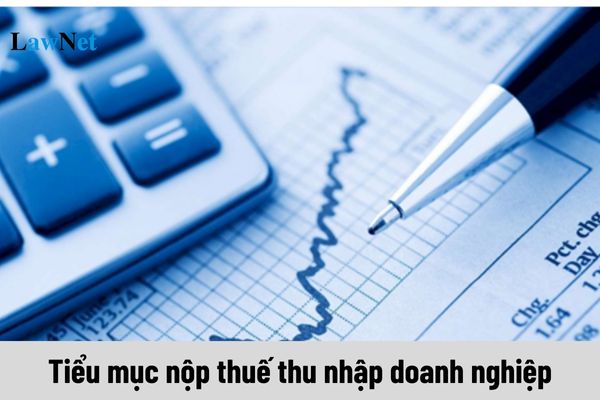Vietnam: What are the codes of 06 sub-sections for CIT payment in 2024?
What are the codes of 06 sub-sections for CIT payment in 2024 in Vietnam?
According to point b, clause 1, Article 4 of Circular 324/2016/TT-BTC, the sub-section (also known as the economic content code - NDKT) is a detailed classification of the section, used to classify detailed State budget revenues and expenditures according to the management objects in each section.
Under Appendix 3 of the List of sections and sub-sections issued together with Circular 324/2016/TT-BTC, the sub-sections for CIT payment in 2024 are stipulated as follows:
| section code | sub-section code | Name | |
| section | 1050 | Corporate Income Tax | |
| sub-section | 1052 | Corporate Income Tax from Business Operations (including services in the petroleum sector) | |
| 1053 | Corporate Income Tax from Real Estate Transfer | ||
| 1055 | Corporate Income Tax from Capital Transfer Activities | ||
| 1056 | Corporate Income Tax from Oil and Gas Exploration and Exploitation Activities (excluding corporate income tax collected under agreements, oil and gas exploration and exploitation contracts) | ||
| 1057 | Corporate Income Tax from Lottery Activities | ||
| 1099 | Others |
View detailed chapter codes: Here

What are the codes of 06 sub-sections for CIT payment in 2024 in Vietnam? (Image from the Internet)
What does income subject to CIT in Vietnam include?
Under Article 3 of CIT Law 2008, amended by Clause 1, Article 1 of Law on Amendments to Tax Laws 2014, taxable income includes income from production and business activities in goods and services and other income.
Other income includes:
- income from transfer of capital, transfer of the right to capital contribution;
- income from real estate transfer, transfer of construction projects, transfer of the right to participate in construction projects, transfer of the right to mineral exploration, mineral extraction, and mineral processing;
- income from the right to enjoyment of property, right to ownership of property, including income from intellectual property rights defined by law;
- income from transfer, lease, liquidation of assets, including valuable papers; income from deposit interest, loan interest, sale of foreign exchange;
- income from collection of debts that were cancelled;
- income from receipts from debts without creditors; incomes from business operation in previous years that were committed, and other incomes.
Concerning Vietnamese companies making investments in the countries with which Vietnam has a Double Taxation Agreement and transfers incomes exclusive of CIT paid overseas to Vietnam, regulations of such Double Taxation Agreements shall apply.
If investments are made in countries with which Vietnam has not had Double Taxation Agreements, and if CIT incurred in such countries is lower than that imposed by the Law on CIT of Vietnam, the tax difference shall be paid.
What incomes are subject to CIT exemption in Vietnam?
According to Article 4 of the Law on CIT 2008 as amended and supplemented by Clause 3 of Article 1 of the Law on Amendment to Law on CIT 2013 (and further amended by Clause 1 of Article 119 of the Law on Medical Examination and Treatment 2023 and Clause 2 of Article 1 of the Law on Amendments to Tax Laws 2014), the income exempt from CIT includes:
- Income from crop planting, husbandry, aquaculture, processing of agricultural and seafood products, and salt production by cooperatives; income of cooperatives operating in the agriculture, forestry, fishery, and salt industries in areas with difficult socio-economic conditions or in areas with particularly difficult socio-economic conditions; income of enterprises from crop planting, husbandry, aquaculture, processing of agricultural and seafood products in areas with particularly difficult socio-economic conditions; income from seafood catching activities.
- Income from providing direct technical services serving agriculture.
- Income from the implementation of research and development contracts, products in the trial production period, products made from new technology applied for the first time in Vietnam.
- Income from production and business activities of goods and services of enterprises where 30% of the average workforce in a year or more are people with disabilities, people after rehabilitation, people infected with the Human Immunodeficiency Virus (HIV/AIDS) and having an average workforce of twenty or more people in a year, excluding enterprises operating in the finance, real estate business sectors.
- Income from vocational training activities specifically for ethnic minorities, people with disabilities, children in particularly difficult circumstances, and social evils subjects.
- Income allocated from capital contribution activities, joint ventures with domestic enterprises, after paying CIT as prescribed by the Law on CIT 2008.
- Sponsorships received for activities in education, scientific research, culture, arts, charity, humanitarian aid, and other social activities in Vietnam.
- Income from the transfer of emission reduction certificates (CERs) of enterprises granted emission reduction certificates.
- Income from performing State-assigned duties of the Vietnam Development Bank in investment credit, export credit; income from credit activities for the poor and other policy objects of the Social Policy Bank; income of state financial funds and other state funds operating not for profit as prescribed by law; income of organizations wholly owned by the State formed to handle bad debts of Vietnamese credit institutions.
- Undistributed income of socialized establishments in the fields of education, training, healthcare, and other socialized fields to be reinvested in those establishments according to specialized laws on education, training, healthcare, and other socialized fields; income forming non-distributable assets of cooperatives established and operating under the 2023 Law on Cooperatives.
- Income from technology transfer within priority sectors to organizations or individuals in areas with particularly difficult socio-economic conditions.

